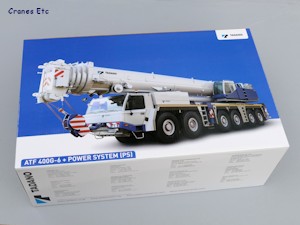 | | The box. | 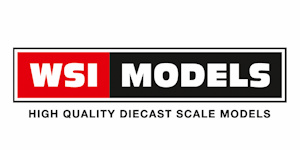 | 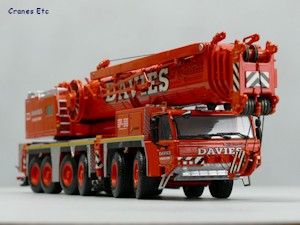 | | Fitted with the Power System on top of the boom. | 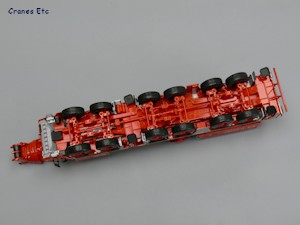 | | Detailed chassis. | 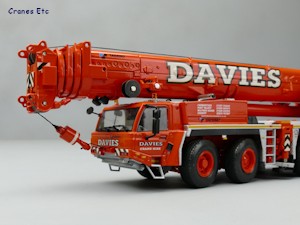 | | Excellent graphics. | 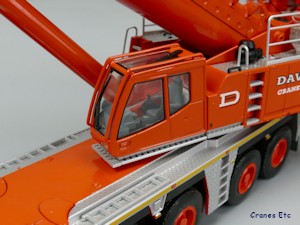 | | Cab does not tilt as the real crane tilts the seat internally. | 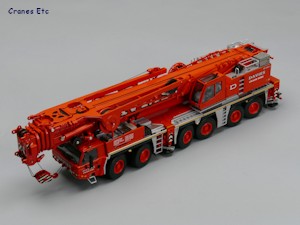 | | On the road with the Power System. | 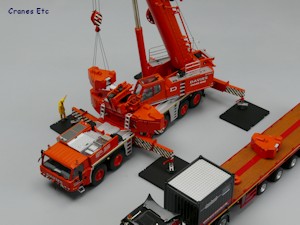 | | Counterweight loaded on the deck. The straps for lifting the block are included. | 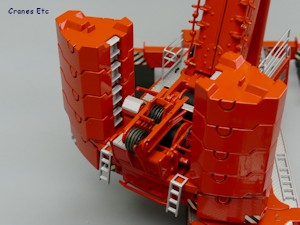 | | Heavy counterweight blocks. | 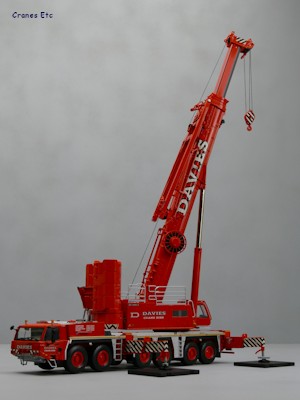 | | Ready to lift without the Power System. | 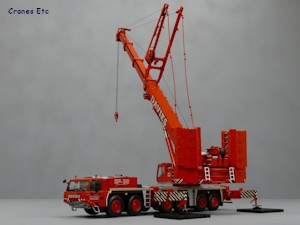 | | Waiting for the load. | 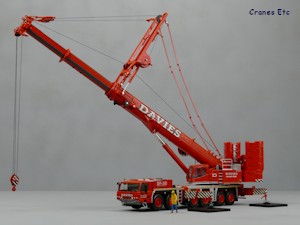 | | Impressive. |
|  Comment on this model. Comment on this model.
The Tadano ATF 400G-6 All Terrain mobile crane has a maximum capacity of 400 tonnes at 2.7m radius.
This version of the model is in the colours of Davies Crane Hire, a Welsh crane hire company. The real crane in this livery was displayed at the BAUMA Exhibition in 2013.
Packaging
The model comes in a Tadano branded box with the model held within two expanded polystyrene trays.
There were no missing parts on the review model.
There was one small manufacturing defect with the guide pulley on the Power System installed in the wrong orientation. It was removed and refitted.
There is no information about the real crane, but the model has very good assembly manual. It has a parts list and very clear photos, but there is no reeving information for the largest hook block.
Detail
The chassis is highly detailed and it has fully replicated transmission and suspension systems. There are modelling steering linkages for each of the front and rear axle triples.
The tyres are very good with a fine tread pattern, and Michelin and the tyre details are moulded in the sidewalls. The wheels are very good with different hubs for driven and non-driven axles.
The driving cab has a loop for hitching the hook whilst travelling and there is a fixed access ladder underneath. The cab detailing is very good with full mirrors and a realistic number plate. Inside the cab there is good-looking console detailing.
Behind the driving cab the engine area is impressive, with fine mesh grilles and 'No Step' rendered in one surface. The metal chrome exhaust includes realistic holes in the pipes. Black replica rubber skirts sit above the wheels.
The outriggers are very good. The pads have locking bars which keep the pads under the crane neatly when on the road. The pistons are smooth with the screw mechanism being internal so they look realistic and tiny sharp graphics add to the realism. Large metal spreader plates with useable lifting points are also included with the model.
At the rear of the carrier the lights have plastic lenses.
The crane cab has metal grab rails with window wipers, and the interior detail is very good with some console detailing. There is a good quality chrome exhaust box with 'No Step' etchings. Two sets of metal handrails are supplied - one for when the crane is in transport mode and the other for when it is working. The Davies graphics on the body are high quality and look great.
The counterweight tray and second winch appears to be formed of separate pieces, but they are not easily separated so all the flexibility of the real crane cannot be posed. The second hoist gear is ready-reeved gear for a luffing fly jib. The separate 11 tonne counterweight blocks enable a full configuration of 98 tonnes and each block is nicely formed with steps indicated. A nice touch is that two thread lifting straps are provided to pose the counterweight blocks being lifted.
The main boom ram is a very good metal part. Detailing on the boom includes a large rotating spooling drum and many small details within the casting. The inner telescope sections have a realistic profile with thin walls. At the boom head the pulleys are metal.
The 'Power System' for the telescopic boom comprises a simple metal frame. The pendants are metal and the winch is a decent metal part.
Three metal hooks are supplied and they are very good quality. One is a single line block, one has a single pulley, and the third has nine pulleys. The design of the large hook block means that it is challenging to reeve the inner pulleys.
Features
The axles have steering which is linked as two groups of three. It allows a moderate range of steering movement. The linkages effectively restrict the possible steering modes so it would have been better if none of the axles had been linked. There is sprung suspension on each axle which performs well.
The outriggers can be extended and lowered, and feature locking bars for use when the crane is in transport mode. The range of travel on the pistons is adequate when used with spreader plates. The crane can be supported wheels-free.
The counterweight system can be fitted in various configurations, including being mounted on the carrier deck during self-assembly. The secondary hoist is reeved to the luffing system but the luffing system is not readily removable which is a pity.
Raising the boom is easy as the locking mechanism on the main boom ram is by means of using a supplied hex key in the grub screw and this works well. On the review model the piston was a little smaller than the inside diameter of the jacket with the result that tightening the screw resulted in a slight loss of straightness.
Telescoping the boom is smooth and easy with a spring clip to lock each boom section. A very good feature is that there are locking positions at 46%, 92% and 100%.
The 'Power System' can be displayed attached or removed. When in place the system is operated with a key and performs well. However there is no positive brake on the winch so the tension is limited to the friction within the winch.
The key is also used to operate the main winch. It has a positive brake but it is a little bit odd as pushing with the key engages it rather than releasing it. You therefore have to ease the drum towards the key before turning it. The exhaust system is removable to enable access to operate the winch and this is a good modelling solution.
The large hook block has working safety catches.
Quality
WSI has produced a high quality model with a high metal content.
The paint and graphics are very good and the Davies Crane Hire livery is replicated very well.
Price
This model is reasonable value for a limited edition.
Overall
This version of the Tadano ATF 400G-6 is an eye-catcher in the Davies Crane Hire livery. It is well made with very good detailing and decent functionality.
Footnotes
The model was shown as a prototype at BAUMA 2013 and appeared firstly in Tadano factory colours in 2014.
|
| |
| 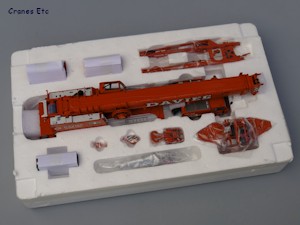 | | Tray of parts. | 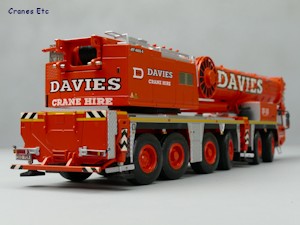 | | Travelling without the power system. | 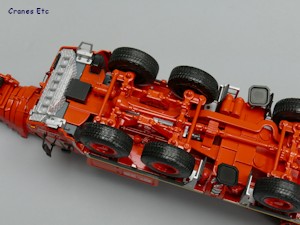 | | Gear box visible in silver. | 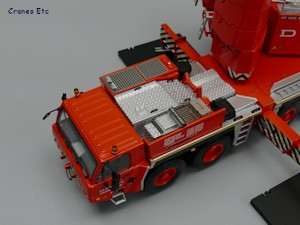 | | High detail over the engine. | 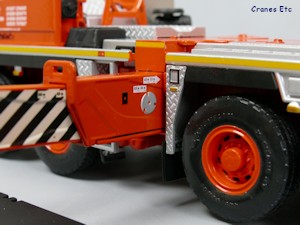 | | Excellent tiny graphics. | 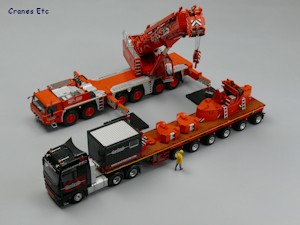 | | Setting up. | 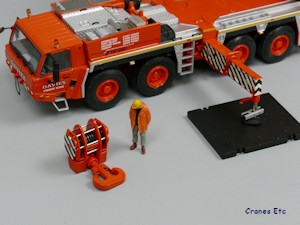 | | Big hook block is good. | 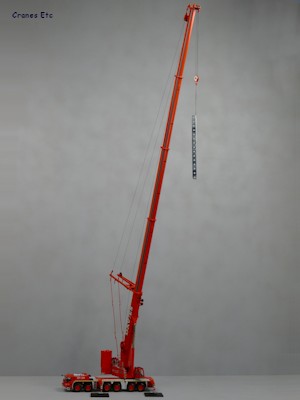 | | Crane at 100% boom locks lifting a steel section. | |
| 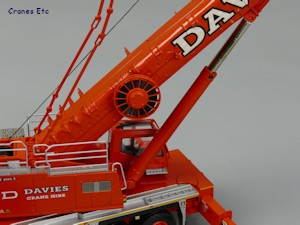 | | Nice spooling drum. |
|

